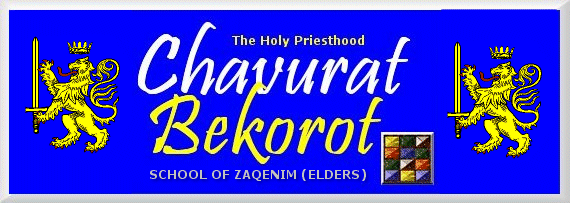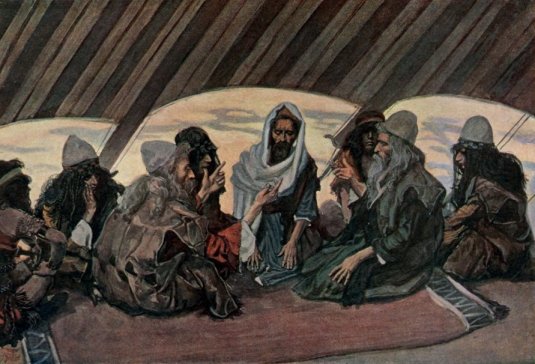

2
OLD TESTAMENT ESSAYS
 The Significance of Aaron, Jethro, Joshua, Eleazar and Balaam
The Significance of Aaron, Jethro, Joshua, Eleazar and Balaam
in the Pre-Canaanite Era
(18 February 1983)
by Christopher C. Warren, M.A.(Oxon)

A. Aaron
Aaron, which in the Hebrew means 'enlightened', was born in Egypt to Aram and Jochabed of the tribe of Levi (Levi was his great-grandfather). Miriam was his elder sister and Moses his younger brother by three years.
Aaron was appointed as Moses' spokesman by Yahweh owing to his brother's reluctance to speak to Pharaoh and also eprformed miracles in the Egyptian royal court. He was responsible for beginning the ten plagues against Egypt by stretching forth his rod. His rôle as spokesman during the forty years exodus diminished but during this time he assisted Hur in supporting Moses' arms during the Israelites' first battle against the Amalekites.
Aaron is perhaps best known in his rôle as Cohen Gadol or High Priest of Israel and was responsible for directing all features of worship at the tabernacle and supervising the work of the thousands of Levites engaged in its service. He was also responsible as a teacher of the Word of Yahweh and looked after the Urim & Thummim, Israel's sacred oracles.
Aaron is also remembered for his shortcomings. Whilst Moses was atop Mount Horeb, he (Aaron) was persuaded by the people to construct a Golden Calf which was subsequently worshipped idolatrously. He was forgiven for this trespass by Yahweh and assisted in the slaughter of those who had perverted Yahweh's Covenant. Later, though, he was to criticise Moses under the influence of his sister Miriam for his brother's marriage to a Cushite woman called Tharbis of Meroë. When Mirian was struck with leprosy he was quick to repent, yet later on he was to share Moses' sin in not giving Yahweh the credit for bringing forth water from the rock at Meribah in Kadesh.
Yet notwithstanding his weakness, Aaron faithfully carried out his duties. His high office was transferred shortly before his death on Mt.Hor.
B. Jethro
Jethro was Moses' father-in-law and a Kenite (Midianite). He was also called Reuel which may have been his personal name whereas Jethro, which in the Hebrew means 'excellence', may have been a title. He was the "priest of Midian". Being head of a large family of at least seven daughters and one named son, and having the responsibility not only to provide for his family materially but also to lead them in worship, he is appropriately called "the priest (or chieftain) of Midian". This does not necessarily indicate that he worshipped Yahweh, but Jethro's ancestors may have had a true worship inculcated in them, and some of this perhaps continued in the family. His conduct at least suggests a deep respect for the Elohim (God) of Moses and Israel.
Moses marriedone of his daughters, Zipporah, whilst in exile from Egypt, and looked after his flocks for some forty years. When Moses returned from Egypt after his call, Jethro met with him at Mt.Horeb (Sinai) and held a sacrifice to Yahweh in thanksgiving for the deliverance of Israel. Here he also advised Moses to delegate the administration of justice.
Jethro is significant for many reasons: his blood ties to Moses, his conversion to Yahweh, and his practical advice to Moses at a time of great administrative strain. His son Hobab was also converted.
C. Joshua
Joshua was the sun of Nun, grandson of Elishama chief of Ephraim. His Hebrew name, Hoshea, litereally means 'salvation', to which Moses added the Divine Name (Yah), calling him Yehoshua (Joshua). At the Exodus Joshua was a young man. Moses chose him as a personal assistant, and gave him command of a detatchment from the as yet unorganised tribes to repel the raising Amalekites at Rephidim. As the Ephraimite representative on the reconnaissance from Kadesh, he supported Caleb's recommendation to go ahead with the invasion of Canaan.
While Moses was alone before Yahweh at Sinai, Joshua kept watch; in the Tent of the Meeting he also learned to wait on Yahweh, and in years following something of Moses' patience and meekness was doubtless added to his valour. In the plains by Jordan he was formally consecrated as Moses' successor to the military leadership, coordinate with Eleazar's priesthood. He was then probably about 70 years old, and his senior, Caleb, was a remarkably vigorous 85 when he began to occupy the Judean hills.
Joshua occupied and consolidated the area of Gilgal, fought successful campaigns against Canaanite confederacies, and directed further operations as long as the united efforts of Israel were required. Settlement of the land depended upon tribal initiative, which Joshua sought to encourage by formal allocation at Shiloh, where the national sanctuary was established. The time had come for him to dissolve his command and set an example by retiring to his own lands at Timnath-serath in Mt.Ephraim. It was perhaps at this time that he called Israel to the national covenant at Shechem.
Joshua died aged 110, and was buried near Timnath-serah. His significance in the history of Israel is therefore incontenstible and played a rôle almost as great as Moses himself in moukding the Israelites into a people and a nation.
D.Eleazar
Eleazar was the third son of Aaron and Elisheba, and husband of one of the daughters of Putiel, who bore him Phineas. The life of Elezar is of special interest in showing the nature of the Israelite priesthood in the days of the theocracy.
Aaron and his four sons were all consecrated to the service of Yahweh, and after the death of Nadab and Abihu, Aaron and his two sons remaining, Eleazar and Ithmar, continued to exercise priestly functions. Eleazar was set over the Levites, and to him was assigned the care of the sanctuary, and other priestly offices.
When the Israelites left Kadesh-barnea and were on their way to the land of promise, and had reached Mt.Hor, Aaron prepared to meet his death. There took place his 'chastisement'. Under the direction of Yahweh, Moses, Aaron and Eleazar ascended the mount together whereupon Moses divested Aaron of his priestly garments and placed them on Eleazar. Aaron then died.
The relationship between Joshua and Eleazar is shown in Num.27:15-23 when Moses sets Joshua before Eleazar with a charge, which is that Eleazar is to be his counsellor, by the divine oracle (Urim & Thummim), as to his going out and his coming in. This means that Eleazar may have played a very important rôle as Yahweh's mouthpiece during Joshua's campaign in Canaan.
Eleazar assisted Moses in numbering the people and later in the important matter of dividing the land with Joshua. When a question of female inheritance arose, this was brought before Moses and Eleazar for a decision, and Eleazar with Joshua carried it into effect. When Moses sent the people to war against the Midianites, Phinehas, Eleazar's son, went with them and Eleazar was with Moses. When he received the spoil Eleazar was by his side.
There is only a brief statement of Eleazar's death and burial.
E. Balaam
Balaam was the son of Beor, but that does not give sifficient reason to identify him with Bela the son of Beor, a king in Edom (Gen.36:32). He was living in Pethor on the river Euphrates, probably the same as Pitru, 12 miles south of Carchemish. In Joshua he is called a soothsayer, somebody who not only predicts the future but also influences it by his prediction.
Balaam was hired by Balak, king of Moab, in order to rob the Israelites of their strength by his curses. At first Balaam refuses to come because Yahweh instructs him not to go but is given permission upon receipt of Balak's second deputation. En route Balaam is stopped by an invisible angel who is nonetheless visible to his donkey and is warned only to say what Yahweh was to put into his mouth.
At various places in Moab Balaam blesses Israel instead of cursing her, and pronounces many dramatic prophecies. He predicts Israel's victories against her enemies, including Balak's Moabites, and the rise of King David, much to the consternation and anger of Balak. Following this, he departed.
But Balaam did not depart the scene honourably. Perhaps under the enticement of more rewards, he was apparently instrumental in causing a part of Israel to fall into idolatry while in Transjordan, and so was responsible for the death of many Israelites. Balaam was eventually slain along with the rest of the Midianites.
Balaam is significant in that he shows how Yahweh can work through pagan priests to suit His purposes. Once left to his own devices, Balaam reverted to his idolatry. Though some have suggested that Balaam was a prophet of Yahweh who later apostatised, this does not seem likely, in view of his abandonment of the inspiring blessings of which he was instrumental in giving Israel. His motive was undoubtedly fear for deep down he was really interested in money. In the end he received the wages for his sins.



This page was created on 31 July 2009
Updated on 31 July 2009
Copyright © 1987-2009 NCCG - All Rights Reserved


